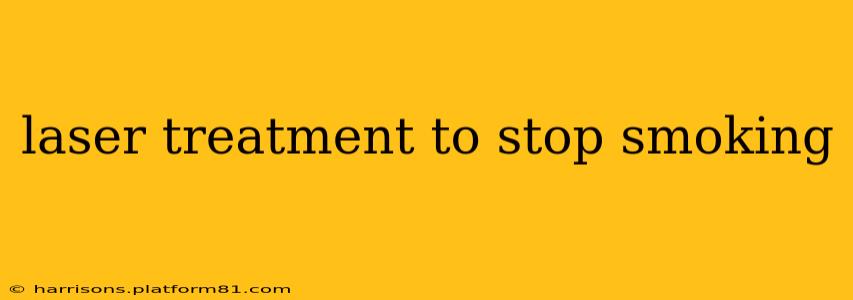Quitting smoking is a challenging journey, and many smokers seek alternative methods to traditional nicotine replacement therapy or counseling. One such method gaining attention is laser treatment for smoking cessation. But does it actually work? Let's delve into the science, efficacy, and potential benefits and drawbacks of this approach.
What is Laser Treatment for Smoking Cessation?
Laser treatment for smoking cessation, often referred to as low-level laser therapy (LLLT) or photobiomodulation, uses low-intensity lasers to target specific acupuncture points on the body. The theory behind it is that these lasers stimulate the release of endorphins and other neurochemicals that reduce nicotine cravings and withdrawal symptoms. The treatment is generally painless and non-invasive. It's important to note that this is not the same as laser surgery or other high-intensity laser procedures.
Does Laser Treatment Really Help You Quit Smoking?
The effectiveness of laser treatment for smoking cessation is a subject of ongoing debate and research. While some studies suggest positive results in reducing cravings and withdrawal symptoms, more large-scale, rigorously designed clinical trials are needed to confirm its efficacy conclusively. Currently, there's no widespread consensus within the medical community on its effectiveness as a standalone smoking cessation treatment.
Many proponents highlight the reported success rate and lack of side effects as compared to medication. However, it's crucial to remember that individual results can vary significantly. The success of any smoking cessation method, including laser treatment, often hinges on the individual's commitment and overall approach to quitting.
What are the Potential Side Effects of Laser Treatment for Smoking Cessation?
Generally, laser treatment for smoking cessation is considered safe and well-tolerated. Reported side effects are typically mild and infrequent, potentially including temporary redness or slight discomfort at the treatment site. However, it's vital to consult a qualified healthcare professional before undergoing any laser treatment to discuss potential risks and ensure suitability.
How Does Laser Treatment Compare to Other Smoking Cessation Methods?
Laser treatment is just one of many methods available to help people quit smoking. Traditional methods include:
- Nicotine Replacement Therapy (NRT): Patches, gum, lozenges, inhalers, and nasal sprays provide controlled doses of nicotine to reduce cravings.
- Medication: Prescription medications like bupropion (Zyban) and varenicline (Chantix) can help manage withdrawal symptoms and reduce the desire to smoke.
- Counseling and Behavioral Therapy: These approaches focus on addressing the psychological and behavioral aspects of addiction.
The best approach often depends on individual needs and preferences. Some individuals may find laser therapy beneficial as a complementary treatment alongside other methods.
Is Laser Treatment for Smoking Cessation Covered by Insurance?
Insurance coverage for laser treatment for smoking cessation varies greatly depending on the insurance provider and policy. It's crucial to contact your insurance company directly to inquire about coverage before undergoing treatment.
How Much Does Laser Treatment for Smoking Cessation Cost?
The cost of laser treatment for smoking cessation can vary widely depending on location, the number of sessions required, and the clinic providing the service. It's essential to obtain a detailed cost estimate before committing to treatment.
Where Can I Find a Qualified Practitioner for Laser Treatment for Smoking Cessation?
It's imperative to seek treatment from a qualified and experienced healthcare professional specializing in laser therapy or smoking cessation. Look for practitioners with appropriate certifications and a good reputation. Do your research and read reviews before making a decision.
Disclaimer: This information is for educational purposes only and should not be considered medical advice. Always consult a healthcare professional before starting any smoking cessation program or treatment. The effectiveness of laser treatment for smoking cessation is still under investigation, and individual results may vary.
